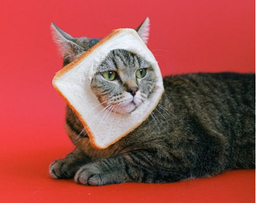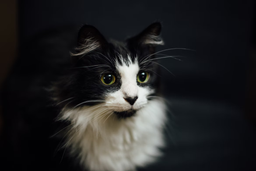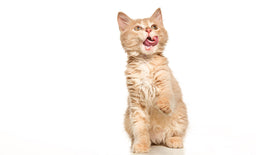Your cat won’t eat dry food? Here’s why
Cats tend to be picky and quite particular about their meals. Finding the right food for your furry companion can turn into a never-ending quest. When a feline rejects food they previously enjoyed, it might be a sign of a health issue or indicate that the product is not tasty or nutritious enough. Let’s find out why your cat won’t eat dry food and what you can do about it.
My cat won’t eat dry food—possible reasons behind appetite loss

I don’t feel like eating, hooman!
Source: vincent van cat
There are numerous reasons why your cat would refuse to eat dry food. A sudden change in their diet is a common culprit. If your cat is accustomed to eating wet food, they won’t transition to cat kibble easily. Cats enjoy a consistent diet, so interruptions are rarely welcome.
Other typical reasons for appetite loss include:
- Tooth and gums injury or disease
- Acute illness
- Underlying chronic condition
- Parasitic infection
- Change in the environment
- Too many snacks
- Dehydration
- Spoiled food
- Recipe changes
Tooth and gums injury or disease
Not eating dry food can be related to tooth and gum problems. Your kitty might have a fractured tooth, lacerations in the mouth cavity, or gum disease. The most common oral issues include:
- Gingivitis—An inflammation of the gums caused by a build-up of plaque on the teeth. If the excess plaque accumulates, it can damage the gums and teeth. This will make eating painful for your furry companion
- Tooth resorption—The most common cause of tooth loss in cats is tooth resorption. It occurs when dentin in a tooth (or several teeth) erodes and becomes irreparably destroyed
- Periodontitis—An inflammatory disease characterised by loss of periodontal attachment is called periodontitis. The tissue surrounding the teeth and gums weakens, causing pain, gingival bleeding, and appetite loss. Eight out of ten cats over the age of three suffer from gum inflammation
Acute illness
A sudden appetite loss can be more than regular fussiness and indicate that there’s something wrong with your kitty’s health. It may be a short-term digestion issue, but you should monitor their behaviour in the following days (after they stop eating).
If your feline friend refuses food for more than a day and shows concerning symptoms, such as vomiting, diarrhoea, fever, and fatigue, you must take them to the vet. Check out the possible reasons why your feline stopped eating:
- Pancreatitis
- Constipation
- Gastrointestinal issues
- IBS (irritable bowel syndrome)
- Respiratory infection
- Urinary tract diseases, such as cystitis and struvite crystals
The vet will ask about your kitty’s routine, diet, breathing, behaviour, litter tray habits, and overall lifestyle. They will perform a complete physical examination of your cat so that they can determine what’s wrong.
Serious chronic diseases
Short-term illnesses are easily treatable in most cases, but chronic conditions require a complete lifestyle change. The most common conditions causing the loss of appetite are:
- Kidney disease—Renal insufficiency (kidney disease) is difficult to spot because symptoms appear only after your cat loses 75% of their kidney function. One of the first symptoms of this disease is appetite loss
- Immune system disease—These diseases can be caused by viral infections (e.g. feline immunodeficiency virus), malnourishment, and stress. Other frequent viral pathogens are parvovirus and feline leukaemia virus
- Cancer—The most common cancer types in cats are lymphoma, bone cancer, cell carcinoma, and mast cell tumour. The telltale signs are palpable lumps under the skin that tend to change in size
- Diabetes—The accompanying symptoms of diabetes are increased thirst and urination, weight loss, and increased appetite. Diabetes can also cause nausea accompanied by the loss of appetite
Parasitic infection
If your cat has a parasitic infection, they will probably be in a lot of discomfort and pain, which will cause appetite loss. The common parasites your cat might catch are:
- Roundworms
- Heartworms
- Tapeworms
- Hookworms
Besides the loss of appetite, parasitic infections cause vomiting, diarrhoea, and a dull coat. If you suspect that your furry friend has parasites, take them to the vet immediately to get a suitable treatment. After the parasites are out of your kitty’s system, their appetite should go back to normal.
Changes in the environment
Cats are creatures of habit, so any change in the environment can cause stress leading to appetite loss. Changes especially affect indoor kitties who got used to their domestic lifestyle. Felines start acting strangely when:
- There is an addition to the household, such as a new pet or a person—To make them get used to a new pet or a person in the house, try showing them that this change doesn’t threaten them. You can do so by establishing a new routine that will help your cat adapt to the circumstances
- You change the way you clean their bowl—If you’ve stopped cleaning your cat’s bowl as frequently as before, this might result in appetite loss. Solve this issue by ensuring that there are no weird-smelling food leftovers in the bowl. Clean the bowl before meals
- They switch to a different food—Changing food brands may be fine with cat parents, but your feline friend might not react well to this change. They will refuse to eat the new product because they’re accustomed to the old one. What you can do is mix the old and new food to introduce the change and reduce the amount of old food gradually
- Their routine is disrupted—If you change the usual mealtime, your cat might not like the sudden disruption of the regimen. It’s easy to solve this issue—go back to the old routine, and your feline will probably regain their appetite
Too many snacks
Your cat might lose their appetite if they get a lot of treats in between meals. No matter how cute your kitty looks when they’re asking for treats, you must keep them under 10% of their daily food intake.

There are many reasons for appetite loss, but the most common one is too many treats!
Source: frida the sphynx
Most commercially available treats contain taste enhancers (making your kitty crazy about them) but offer no nutritional value. Instead of buying snacks that can be harmful to your furry friend’s health in the long run, settle for healthier treats, such as ham and bacon. Don’t go overboard with these snacks as cured deli meats are high in fat and can cause obesity.
Some specialists claim that high-fibre fruits and vegetables, such as apples, bananas, strawberries, pumpkin, carrots, asparagus, and broccoli, can help with bowel movement. If your kitty shows interest in such snacks, it's safe to give them the tiniest amounts from time to time.
As cats are obligate carnivores, their diet should be based on meat, and so should their snacks. If you want to treat your cat to a delicious protein-packed treat, feed them some chicken, duck, fish, liver, salmon, tuna, or mackerel.
Don’t feed them human treats, such as chocolate, popcorn, and peanut butter, because some of them can be highly toxic, while others may cause digestion issues and allergic reactions.
Dehydration
Your cat might stop eating dry food because they’re dehydrated. Since biscuits contain less than 14% of moisture, switch them to wet food and install a kitty water fountain—cats prefer running water.
High-quality wet food is ideal for your cat because it contains animal protein, fat, vitamins, minerals, and the ideal level of moisture. If your cat doesn’t want to eat it, you can use several methods to make them change their mind:
|
Method |
Description |
|
Add a small portion of wet food to biscuits, then gradually increase the amount with each serving until kibble is phased out |
|
|
Combine kibble with soup or broth and then add wet food |
Cats usually love chicken soup or bone broth, so they won’t refuse the meal. You can slowly remove biscuits altogether once your cat gets used to the new texture |
Spoiled food
If your feline friend doesn’t eat their dry food, check the box for the expiry date. Kibble tends to absorb moisture and get spoiled. To prevent this, keep the product in a cool and dry place.
You should also avoid feeding raw food (e.g. raw chicken) to your cat as it can get spoiled and lead to food poisoning. Raw meat and eggs often contain harmful bacteria like Salmonella, Listeria, and E. coli, carrying a high risk of cross-contamination.
Changes in the recipe
Another reason your cat won’t eat dry food might be the change in the manufacturer’s recipe. Cats have a strong sense of smell and taste, and even the slightest changes in the ingredients won’t go unnoticed. If you believe your cat no longer likes the product they have been eating for years, opt for a different, more reliable brand.
Does your cat need kibbles? What is in dry cat food, and can cats thrive on it?
Cat kibble is heavily processed dry food commonly made from grains, vegetables, and animal derivatives. Some cat food manufacturers even use eggs instead of meat, which is especially inappropriate because cats need animal protein from meat to thrive.
Biscuits are usually high in carbohydrates and sugar, with added synthetic vitamins and probiotic supplements, which compensate for the product’s subpar nutritional value.
Your cat refusing dry food might not be the worst-case scenario since cats benefit from quality wet food that is:
- High in moisture (at least 70%)
- Rich in animal proteins (more than 50%) which are the best source of essential amino acids, such as taurine
- Filled with natural vitamins and minerals
- Moderate in animal fat (up to 20%)
- Low in carbs (less than 3%)
Dry cat food doesn’t have an appropriate nutrient ratio as it is low in moisture content, essential fatty acids, and animal proteins.
How can I get my cat to eat dry food?
While cats shouldn’t eat biscuits regularly because they aren’t healthy, some vets claim that cat kibble helps with dental hygiene. If you want to ensure your cat eats their biscuits at least occasionally, try mixing wet and dry food, make sure their bowl is clean, and remove all potential stressors from their environment.

Make sure the bowl is clean when feeding your furry friend. They don’t like the smell of stale food.
Source: kr bengals
Forget about dry food! Untamed is the ultimate wet food for your furry friend
Untamed cat food is the perfect choice for your cat because we offer high-protein wet food that keeps felines fit, healthy, and satisfied. Our dishes are prepared with the finest cuts of human-grade whole meat and organs (60% to 63%). Our gravy and jelly products contain no fillers like sugar, grains (e.g. rice and sweetcorn), animal derivatives, or plant proteins.
You and your feline companion will love Untamed because our:
- Food is a protein bomb—Untamed food contains two times more protein than the average cat food product
- Recipes are vet-formulated—We collaborated with vets to create recipes for optimal nutrition. Our dishes agree with all your kitty’s biological needs
- Dishes are gently steamed—As we gently simmer our food, the bioavailability of the ingredients is intact, and the meat retains the aroma, taste, and texture that will make your cat go bonkers
- Products are hypoallergenic—Our food is free of all common allergens, and we tailor-make our dishes to cater to the needs of allergy-prone kitties with sensitive tummies
Take our TRY NOW quiz and place your first order to get the Untamed starter pack at the best price!

Our food is irresistible!
Image (c) Untamed
Here’s why you should choose Untamed
We are cat parents too, so we worked diligently to create the healthiest and tastiest meals for felines. Untamed is perfect for all kitties, including Persians, Bengals, Siamese, Ragdolls, Maine Coons, and British Shorthairs. You can feed our dishes to:
- Kittens—When they start eating solid food, kittens need a high-calorie diet to develop properly. Untamed’s formula supports their growth
- Adult cats—Pregnant queens and neutered males will appreciate Untamed food because it provides the essential nutrients and helps with weight control. Grown-up felines need whole meat meals to maintain muscle tone and overall health
- Seniors—Untamed is excellent for seniors who are losing weight rapidly as it contains all the necessary nutrients cats need to maintain their ideal weight and agility
We have numerous happy customers who reported the following about the Untamed effect:
|
Timeline |
Improvements |
|
One week |
|
|
Two months |
|
|
Four months |
|
|
For life |
|
Check out our delicious dishes!
Our dishes are made from ethically sourced and cruelty-free ingredients. We use premium-quality meat, like:
- Duck breast
- Chicken breast and liver
- Salmon, sardine, and mackerel fillet
- Tuna steak
Check out some of our delicious recipes below:
- Tuck-in Tuna in Jelly—Dolphin-safe tuna gently cooked in fish broth
- Chocka Chicken in Gravy—Grain- and hormone-free chicken breast simmered in natural gravy, easy on the tummy
- Chocka Chicken with Ham in Gravy—Delicious whole meat chicken with tasty ham as an extra kick, gently simmered in a natural chicken gravy
- Chocka Chicken with Duck in Jelly—Perfect dish for poultry-loving cats served in jelly

Our Chocka Chicken with Duck in Jelly will cater to all your kitty’s biological needs while providing an array of tastes packed in a single tin of perfect food.
Image (c) Untamed
Want to become a part of the Untamed family? Here’s what to do
To buy our canned cat food online, all you have to do is go through the following easy steps:
- Visit our TRY NOW page and complete a short questionnaire
- Select the perfect meal plan
- Place your order for a taster pack
You will get your first pack of Untamed within a day, and shipping is entirely free. If your kitty likes our food, we will continue delivering supplies around the same time every month. You can change, postpone, and cancel your order from your account.
Besides providing an excellent cat food delivery service, we ensure our food comes in 100% recyclable packaging, and our operations leave a neutral carbon footprint.

![Best food for Ragdoll cats in the UK [Broken Down]](http://untamed.com/cdn/shop/articles/featured_best_food_for_ragdoll_cats_uk.jpg?v=1646818249&width=256)

